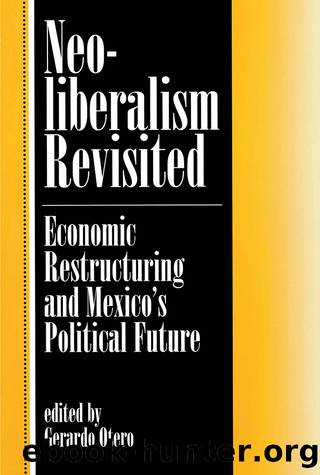Neoliberalism Revisited: Economic Restructuring and Mexico's Political Future by Gerardo Otero

Author:Gerardo Otero [Otero, Gerardo]
Language: eng
Format: epub
Tags: History, Latin America, General
ISBN: 9780813324418
Google: H7wtswEACAAJ
Goodreads: 2545883
Publisher: Westview Press
Published: 1996-04-05T00:00:00+00:00
Program, Factions, and Strategies
Conceived along with the CCE in 1975, the private sector's political program has been amended and augmented in the light of subsequent events. A review of the major proclamations issued by business organizations during the last twenty years7 reveals the following list of demands: (1) a market-oriented economy; (2) increased attention to the private sector's position, as opposed to that of other sectors, in government decisionmaking; (3) reduced bargaining power for trade unions; (4) an invigoration of civil society; (5) official recognition of the legitimacy of business participation in politics, education, public opinion, and so forth. The first demand involves the privatization of government-owned enterprises and the restriction of state intervention to regulatory functions. There are two aspects to the second demand: the reduction and specification of the president's power over economic decisionmaking and the establishment of rational institutional forms of bilateral decisionmaking. The third demand has been manifested in the attacks on collective contracts and negotiations (particularly in state enterprises, where labor has obtained the highest levels of income and social benefits) and on the formulation of proposals to modify Article 123 of the Constitution regulating labor, in accordance to the new status quo. A more robust civil society, the fourth demand, is conceived as one in which the individual, private initiative, entrepreneurship, modernity, citizenship, and the like are the regnant ideals, replacing statism, corporatism, and revolutionary nationalism in the public sphere. The final demand, which is self-explanatory, envisions a new and imposing profile for the private sector and its supporters in society.
The triumph of such a program represents a major reformation of the state in today's Mexicoâa rupture with the "social justice" tradition of the Mexican Revolution. That tradition may be characterized as a reformist practice related to the aforementioned political ambiguity of the Mexican state. Its legal foundations are the so-called social rights protected by the Constitutionâmore specifically, by Article 3, which provides that education is to be state-supported and nonreligious; by Article 27, which defines land and natural resources as the property of the "nation" and specifies that private property can be limited according to the "public interest"; by Article 123, which permits the state to intervene in industrial relations on behalf of labor; and by Article 130, which legislates the separation of church and state.
The historical origins of these constitutional precepts are varied. The provisions concerning education date from the revolutionary period of 1910-1917; those dealing with land and natural resources harken back to the Bourbon reforms of the late colonial era; the prohibition of clerical involvement in politics is rooted in the nineteenth-century liberal reform, which expropriated the agrarian properties of the Catholic Church. In order to restore stability in the aftermath of the revolution, the president was granted "permanent exceptional powers" to enforce the Constitution, thus attaining a dominant position vis-Ã -vis the legislature and the judiciary in Mexico's authoritarian political system. Because constitutional law has thus been enforced in a discretionary manner, the private-sector program has concentrated on changing it.
The
Download
This site does not store any files on its server. We only index and link to content provided by other sites. Please contact the content providers to delete copyright contents if any and email us, we'll remove relevant links or contents immediately.
Zero to IPO: Over $1 Trillion of Actionable Advice from the World's Most Successful Entrepreneurs by Frederic Kerrest(4509)
Machine Learning at Scale with H2O by Gregory Keys | David Whiting(4292)
Never by Ken Follett(3937)
Harry Potter and the Goblet Of Fire by J.K. Rowling(3848)
Ogilvy on Advertising by David Ogilvy(3604)
Shadow of Night by Deborah Harkness(3357)
The Man Who Died Twice by Richard Osman(3072)
Book of Life by Deborah Harkness(2930)
The Tipping Point by Malcolm Gladwell(2911)
Will by Will Smith(2907)
0041152001443424520 .pdf by Unknown(2843)
My Brilliant Friend by Elena Ferrante(2824)
Purple Hibiscus by Chimamanda Ngozi Adichie(2822)
How Proust Can Change Your Life by Alain De Botton(2805)
How to Pay Zero Taxes, 2018 by Jeff A. Schnepper(2646)
Hooked: A Dark, Contemporary Romance (Never After Series) by Emily McIntire(2547)
Rationality by Steven Pinker(2352)
Can't Hurt Me: Master Your Mind and Defy the Odds - Clean Edition by David Goggins(2323)
Borders by unknow(2301)
